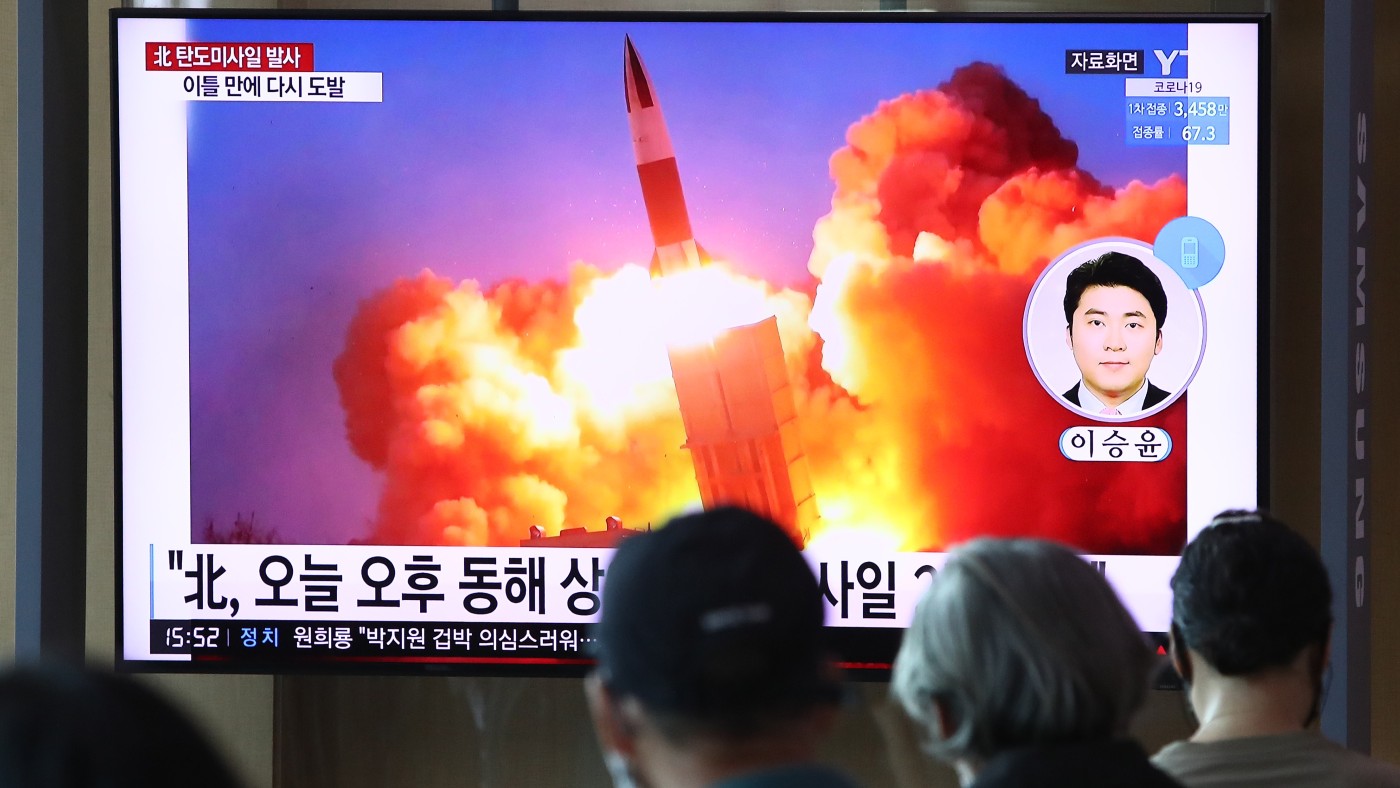North Korea and the limits of missile diplomacy
After ‘duelling’ missile tests on the Korean peninsula, North Korea’s intentions are harder than ever to read

A free daily email with the biggest news stories of the day – and the best features from TheWeek.com
You are now subscribed
Your newsletter sign-up was successful
The Korean peninsula was the site of “duelling” missile tests last week, said Michael Lee in Korea JoongAng Daily (Seoul). On Wednesday, North Korea launched two tactical ballistic missiles, from a train, in defiance of UN resolutions. South Korea, for its part, conducted a submarine-launched ballistic missile test, becoming the first nation without nuclear weapons to have that capability. The tests came soon after North Korean state media said that a long-range cruise missile capable of hitting Japan had been fired into the sea 930 miles away. Cruise missiles can carry a nuclear warhead, and are of particular concern because they fly low and can change direction in flight, evading defence systems.
This arms race had been widely anticipated, said Jung Da-min in Korea Times (Seoul). Donald Trump’s attempt to make a grand bargain with Kim Jong Un failed; President Biden’s efforts to bring him to the negotiating table have been ineffective. In the summer, Pyongyang restarted its plutonium-producing reactor at Yongbyon. In response, South Korean president Moon Jae-in’s policy has been to strengthen his nation’s missile capabilities. Submarine-launched missiles, of the kind his forces have developed, are vital to maintaining a “retaliatory strike” capability: a country that has them can hit back hard, even if its military installations have been devastated by a nuclear attack. The pace has picked up since Biden met Moon at a summit in May and agreed to scrap restrictions on South Korea’s missile programme.
North Korea’s intentions are now harder than ever to read, said Michelle Ye Hee Lee in The Washington Post. Pyongyang sealed its borders during the pandemic, excluding even its only major trading partner, China. This prompted an exodus of foreigners – diplomats, aid workers, business envoys – who usually provided some insights into life in the totalitarian country. But the UN believes its people are suffering “severe” food shortages, and that there is a risk of a major famine. The reasons for its missile tests are still clear enough, said Christoph Bluth and Owen Greene on The Conversation. North Korea uses tests to demonstrate to its own population that “it is a great and powerful nation”. As far as the world outside is concerned, they are designed to “mitigate diplomatic isolation and as leverage to generate international aid”. There are, at present, no credible diplomatic initiatives for engaging with Pyongyang. So we can “expect further missile launches – and possibly nuclear weapons tests – in the near future”.
The Week
Escape your echo chamber. Get the facts behind the news, plus analysis from multiple perspectives.

Sign up for The Week's Free Newsletters
From our morning news briefing to a weekly Good News Newsletter, get the best of The Week delivered directly to your inbox.
From our morning news briefing to a weekly Good News Newsletter, get the best of The Week delivered directly to your inbox.
A free daily email with the biggest news stories of the day – and the best features from TheWeek.com
-
 Political cartoons for February 16
Political cartoons for February 16Cartoons Monday’s political cartoons include President's Day, a valentine from the Epstein files, and more
-
 Regent Hong Kong: a tranquil haven with a prime waterfront spot
Regent Hong Kong: a tranquil haven with a prime waterfront spotThe Week Recommends The trendy hotel recently underwent an extensive two-year revamp
-
 The problem with diagnosing profound autism
The problem with diagnosing profound autismThe Explainer Experts are reconsidering the idea of autism as a spectrum, which could impact diagnoses and policy making for the condition
-
 The fall of the generals: China’s military purge
The fall of the generals: China’s military purgeIn the Spotlight Xi Jinping’s extraordinary removal of senior general proves that no-one is safe from anti-corruption drive that has investigated millions
-
 Epstein files topple law CEO, roil UK government
Epstein files topple law CEO, roil UK governmentSpeed Read Peter Mandelson, Britain’s former ambassador to the US, is caught up in the scandal
-
 Iran and US prepare to meet after skirmishes
Iran and US prepare to meet after skirmishesSpeed Read The incident comes amid heightened tensions in the Middle East
-
 Syria’s Kurds: abandoned by their US ally
Syria’s Kurds: abandoned by their US allyTalking Point Ahmed al-Sharaa’s lightning offensive against Syrian Kurdistan belies his promise to respect the country’s ethnic minorities
-
 Israel retrieves final hostage’s body from Gaza
Israel retrieves final hostage’s body from GazaSpeed Read The 24-year-old police officer was killed during the initial Hamas attack
-
 China’s Xi targets top general in growing purge
China’s Xi targets top general in growing purgeSpeed Read Zhang Youxia is being investigated over ‘grave violations’ of the law
-
 Panama and Canada are negotiating over a crucial copper mine
Panama and Canada are negotiating over a crucial copper mineIn the Spotlight Panama is set to make a final decision on the mine this summer
-
 Iran unleashes carnage on its own people
Iran unleashes carnage on its own peopleFeature Demonstrations began in late December as an economic protest